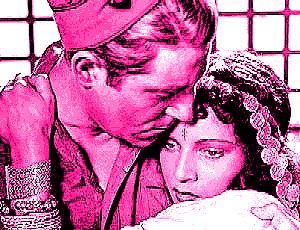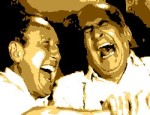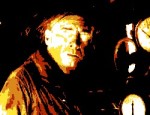Film Review
It was the immense popularity of P. C. Wren's novel
Beau Geste (first published in
1924) that led to a short-lived craze for legionnaire-themed films in
the 1930s.
In the five years that preceded William A. Wellman's
celebrated film adaptation of Wren's novel (with Gary Cooper in the
title role), French cinema had pretty well minded out the genre, the
best examples being Jacques Feyder's
Le
Grand jeu (1934), Jean Grémillon's
Gueule
d'amour (1937) and, most famously, Julien Duvivier's
La Bandera. Of these,
Duvivier's film is the one that panders most shamelessly to the
contemporary fad for sand and uniforms, and for that reason it is far
more valuable for what it says about public tastes and attitudes of its
time than as a historical document. This might also explain why
it has not stood the test of time as well as the director's other great
films -
Pépé le Moko
(1937),
La Belle équipe (1936),
etc.
La Bandera marked an important
milestone in the career of its lead actor, Jean Gabin.
Previously, Gabin had been associated with lightweight melodramas and
comedies, populist ephemera that offered the actor little scope to
develop his craft and even less chance of enduring fame. When
Gabin learned that Duvivier was planning to adapt Pierre Mac Orlan's
best selling novel
La Bandera
(published in 1931), he immediately saw an opportunity to create his
own screen image and lobbied hard for the director to give him the
part. Duvivier agreed, but on condition that Gabin took the role
of Pontius Pilate in his preceding film, his Biblical epic
Golgotha (1935). The star of
that film, Robert Le Vigan, would also appear in
La Bandera, playing the main
supporting role. For the part of the beguiling Moroccan girl,
Aïscha, Duvivier cast one of the best-known French actresses of
the decade, Annabella, whilst Pierre Renoir (the older brother of the
famous director Jean Renoir) was given a substantial supporting role as
an eye-patch-wearing legionary captain.
La Bandera is a classic of
French cinema but it has one serious failing - poor visual effects and
an over-reliance on back-projection. Lacking the resources of the
Hollywood blockbuster, Duvivier had to make some painful compromises
which undermine the film's realism and weaken the power of its
story. Although a large chunk of the film was shot on location
and gives a convincing taste of life in the foreign legion, much was
shot in the studio, and the deadness and confined nature of the 1930s
soundstage sets jar painfully with the spectacular location
sequences. The biggest eyesores are the pick-up studio shots,
where a small group of actors are required to deliver a few crucial
lines of dialogue in front of a risible back-projection. Almost
as bad is the sequence at the end of the film, where the legionnaires
come under an aerial attack whilst holed up in a ramshackle defensive
post. Some more dire back-projection and a spate of painfully
theatrical deaths does tend to dampen the drama and poignancy of the
moment somewhat.
Fortunately, the film has many strengths to compensate for its
technical shortcomings. Gabin's performance alone virtually
salvages the film and his portrayal offers a refreshing departure from
the kind of bland heroism that tended to predominate in this kind of
populist exotica.
The character that Gabin plays here is the one
with which he would become most associated for the rest of the decade,
that of the flawed working class hero who is propelled towards an
inescapable tragic fate by forces beyond his control. No other
French actor of this era evokes the spirit of poetic realism more
palpably than Gabin, so it was inevitable that after this stunning
debut (all his previous films deserve to be forgotten) he would be
invited by director Marcel Carné to play the doomed hero in
Le
Quai des brumes (1938) (another Mac Orlan adaptation) and
Le
Jour se lève (1939).
Whilst
La Bandera is
unquestionably Jean Gabin's film, it is worth paying tribute to the
contributions from his equally talented co-stars. To today's
politically correct mindset, the sight of Annabella blacked up as a
Moroccan girl is uncomfortable viewing at first but, like Gabin's
character, it is not long before we succumb to her charms. With
his penchant for playing double-dealing villains, Robert Le Vigan is a
far more appropriate casting choice for the part of the duplicitous
Lucas, and it is a testament to his skill as an actor that his
portrayal is far from one-dimensional. Just as we cannot
unequivocally sympathise with Gabin's character, neither can we
entirely dislike Le Vigan's - both characters are victims of the
circumstances in which they find themselves. Equally, Pierre
Renoir transcends the familiar archetypal depiction of a legion officer
and instead offers a far more nuanced and humane portrayal, with what
is easily one of his finest screen performances.
Despite the technical limitations, Duvivier's direction shows
considerable flair and inventiveness and, in some ways,
La Bandera is a surprisingly modern
film for its time. Whilst the director would in later years be
written off as being too conventional, too unwilling to take risks, his
early films show a surprising amount of experimentation and are far
from being safe and conventional. Duvivier's inspired, even
daring, use of camera motion in
La
Bandera bears this out admirably, prefiguring the ubiquitous
handheld camerawork in today's action films. Another innovative
(albeit slightly less successful) touch is an eerie dream sequence in
which a montage of the main character's memories are flashed onto a
back-projection screen behind a recumbent Gabin, who is visibly
tormented by his nightmare experience. The darkness and cynicism
that pervades most of Duvivier's subsequent films can be felt in
La Bandera, notably in its shocking
opening and closing sequences (many of Duvivier's films start with a
punch and end with a kick). The film may have been based on
another author's work, it may be slanted a little too obviously to a
popular fad for legionary escapism, but for all that
La Bandera is quintessential
Duvivier, one of his most poignant meditations on man's inability to
take control of his own destiny and live the life he dreams of.
In Duvivier's dark world, we are all instruments of Fate.
© James Travers 2002
The above content is owned by frenchfilms.org and must not be copied.
Next Julien Duvivier film:
La Belle équipe (1936)
Film Synopsis
Pierre Gilieth finds himself a fugitive from justice after killing a man
in a Montmartre bar. He evades arrest by fleeing to Barcelona, where,
penniless and desperate, he decides to enlist in the Foreign Legion.
He soon grows accustomed to his new life and strikes up a friendship with
two fellow countryman, Lucas and Mulot, two other victims of misfortune -
or so it seems. Their regiment is moved to Dar Riffen in North Africa.
Here, during a visit to a local inn, Pierre succumbs to the fatal charms
of a stunning Moroccan girl, Aïscha. So powerfully attracted to
the native is the young legionnaire that he instantly resolves to marry her,
but Fate has other ideas.
Little does Pierre know that his supposed friend Lucas is in fact a police
informer, who has followed him all the way from Paris with the intention
of denouncing him to the authorities and claiming a substantial reward.
Before Lucas can put his scheme into effect, the regiment is sent on to a
fortress in the mountains, a dangerous spot that is occupied by armed and
fierce rebels. As their merciless opponents gather around the fortress,
intent on wiping them out, the legionnaires take a valiant stand against
them. It is a fierce and bloody confrontation and Pierre will die a
hero's death before the day is out...
© James Travers
The above content is owned by frenchfilms.org and must not be copied.



